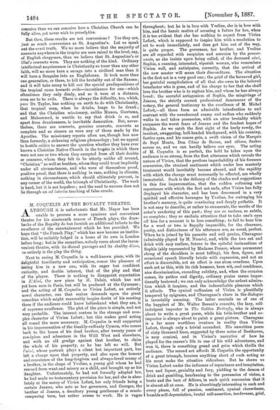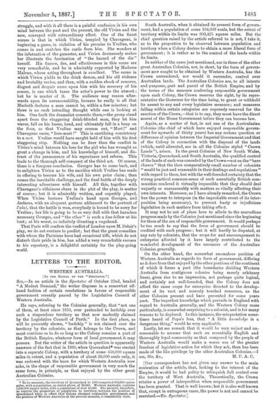M. COQUELIN AT THE ROYALTY THEATRE. A LTHOUGH it is unfortunate that
Mr. Mayer has been
unable to procure a more spacious and convenient theatre for his nineteenth season of French plays, the draw- backs of the Royalty do but furnish an additional tribute to the excellence of the entertainment which he has provided. We hope that " the French Play," which has now become an institu- tion, will be suitably lodged in a home of its own in London before long; but in the meantime, nobody cares about the incon- venient theatre, with its dismal passages and its shabby decor, so entirely is the play the thing.
Next to seeing M. Coquelin in a well-known piece, with its delightful familiarity and anticipation, comes the pleasure of wing him in a new one, with its eager bat confident curiosity, and double interest, that of the play and that of the player. There is nothing to disappoint expectation in L'Aine, the new piece by M. Delair, which has not yet been seen in Paris, but ,will be produced at the Gymnase ; and the acting of M. Coquelin as Vivien Lefort, an entirely novel character, one that makes demands upon the great comedian which might reasonably inspire doubt of his meeting them if the audience could know beforehand what they are, is of supreme excellence. The plot of the piece is simple, and not very probable. The interest centres in the strange and com- plex character of Vivien Lefort ; but this makes good acting all round the more necessary. M. Coquelin is well supported in his impersonation of the frankly-rnffianly Cymon, who comes back to the house of his dead brother, after twenty years of rowdyism and adventure in the Wild West and elsewhere, and with an old grudge against that brother, to claim the whole of his property, as ho has left no wilL But raise, whose portrait plays a silent but important part, has left a charge upon that property, and also upon the honour and conscience of the long-forgiven and always-loved scamp of a brother, in the shape of Yveline, a young girl whom he had rescued from want and misery as a child, and brought up as his daughter. Unfortunately, be had not formally adopted her, he had made no testamentary provision for her, and she is abso- lutely at the mercy of Vivien Lefort, her only friends being a certain Jeanne, who acts as her governess, and Georges, the brother of Jeanne, a desultory young gentleman of a music- composing turn, but rather averse to work. He is vague
throughout; but he is in love with Yveline, she is in love with him, and the heroic motive of securing a future for her, when it is too evident that she has nothing to expect from Vivien Lefort, which is supposed to inspire him with a resolution to set to work immediately, and does get him out of the way, is quite proper. The governess, her brother, and Yveline are all regarded with suspicion and aversion by the gouver- nante, as she insists upon being called, of the deceased aine, Sophie, a cunning, interested, viperish woman, who remembers Vivien well, and anticipates, correctly, that the arrival of the new master will mean their discomfiture. The situation in the first act is a very good one ; the grief of the bereaved girl, her grateful recapitulation of all that she owes to the beloved benefactor who is gone, and of his charge to her that she shall love the brother who is to replace him, and whom he has always loved; the scornful antagonism of Sophie, the misgivings of Jeanne, the strictly correct professional demeanour of the notary, the general testimony to the excellence of M. Michel Lefort,—all these form an admirable introduction to and contrast with the unredeemed scamp and ruffian who suddenly walks in and takes possession, with an utter brutality which surpasses the worst fears of Jeanne and the fondest hopes of Sophie. As we catch the first sight of the burly rowdy, the insolent, swaggering, bull-headed blackguard, with his cunning, furtive eyes, and his coarse grin, a swift vision of the Marquis de Sept Monts, Don Cesar de Bazan, and others, flashes across us, and we can hardly believe our eyes. The acting of M. Coqnelin is so perfect, the hold he takes upon the audience is so strong, from the first utterance which reveals the nature of Vivien, that the perilous improbability of his foreseen conversion, the strained sentiment which under less masterly treatment would inevitably become absurd, and the rapidity with which the change must necessarily be effected, are wholly immaterial. Such is the delicacy of the shades and suggestions in this fine impersonation, that the sudden softening and repentance with which the first act ends, after Vivien has fully displayed his character, and has been denounced in a very spirited and effective harangue by Yveline, for outraging his brother's memory, is quite convincing and deeply pathetic. It is not easy to describe, or rather to enumerate, the merits of the actor's rendering of this part ; they are so various, so subtle, so complete ; they so enchain attention that to take one's eyes off him for a moment is to lose something; to fail to hear him for a word or two is happily impossible, for the clearness, purity, and distinctness of his utterance are, as usual, perfect. When he is joined by his parasite and evil genius, Chavagnac (admirably played by M. Numns), and, while the two eat and drink with racy realism, listens to the spiteful insinuations of Sophie (ably represented by Madame France, whose permanent shrug of the shoulders is most telling), his face, figure, and occasional speech literally bristle with expression, and not an effort is discernible, not an effect is one atom overdone. Upon such art as this, with its rich humour, keen wit, cool confidence, nice discrimination, exceeding subtlety, and, when the occasion comes, its pathos and dignity, ordinary praise seems imper- tinently bestowed ; we can only acknowledge the ardent admira- tion which it inspires, and the indescribable pleasure which it affords. The cynical ruffianism of Vivien is plentifully tempered by epigrams, and Chavagnac's share in the dialogue is invariably amusing. The latter reminds us of one of the happiest of Mr. Walter Besant's conceits, the lazy, self- indulgent impostor in The Golden Butterfly, who is always about to write a great poem, while his twin-brother and co- impostor is always about to paint a great picture. Chavagnac is a far more worthless creature in reality than Vivien Lefort, though only a trivial scoundrel. His unwritten poem of sixty thousand lines, suggested by three notes of Beethoven, is very comical, and in Vivien's narrative of how he played for the craven's life in one of his wild adventures, and won it, there is something grand and grim which thrills the audience. The second act affords M. Coquelin the opportunity of a great triumph, because anything short of such acting as his must make the situation ridiculous. But he shows us Vivien Lefort under the influence of repentance and temptation, love and liquor, geniality and fury, yielding to the demon of drink and gambling, hearkening to the persuasion of virtue, a brute and the best of fellows, in such quick succession that it is almost all at once. He is absorbingly interesting in each and every phase, full of passion, sentiment, cynical shrewdness, bumble self-depreciation, brutal self-assertion, tenderness, grief,
struggle, and with it all there is a painful confusion in his own mind between the past and the present, the old Vivien and the new, conveyed with extraordinary effect. One of the finest scenes is that in which Vivien, tempted by Chavagnac, is beginning a game, in violation of his promise to Yveline, who comes in and snatches the cards from him. She wonders at the infatuation of the gamester, and Vivien dexterously makes her illustrate the fascination of "the hazard of the die" herself. His finesse, fire, and effectiveness in this scene are very remarkable, and he is admirably supported by Madame lfalvau, whose acting throughout is excellent. The scene in which Vivien yields to the drink demon, and his old violence and brutality revive, and then, with a sudden shock of remorse, disgust and despair come upon him with his recovery of his senses, is one which taxes the actor's power to the utmost ; bat he is master of it. The audience may reason after- wards upon its unreasonability, because he really is all that Macbeth declares a man cannot be, within a few minutes; but there is no such intruding thought while one is looking at him. One fault the dramatist commits there,—the group stand apart from the staggering drink-blinded man, they let him waver, fall on his knees, bend, and ultimately fall in a heap on the floor, so that Yveline may scream out, "Mort!" and Chavagnac sneer, " Ivre-mort !" This is sacrificing consistency to a mot. Yveline would have caught hold of him with his first staggering step. Nothing can be finer than the conflict in Vivien's mind between his love for the girl who has wrought so great a change in him, and his knowledge of himself, and dis- trust of the permanence of his repentance and reform. This leads to the thorough self-conquest of the third act. Of coarse, there is a foregone conclusion. Georges has to come back, and to enlighten Vivien as to the sacrifice which Yveline has made in offering to become his wife, and his own prior claim ; then comes the inevitable challenge, and the final battle of the deeply interesting adventurer with himself. All this, together with Chavagnac's villainous share in the plot of the play, is matter of course ; but it is admirably written, and superbly played. When Vivien bestows Yveline's hand upon Georges, and declares, with an eloquent gesture addressed to the portrait of 1'aing, that the battle is won, everybody is bound to be sorry for Yveline ; her life is going to be so very dull with that harmless necessary Georges, and " the other" is such a fine fellow at his best ; at his worst, so infinitely diverting a vagabond.
That Paris will confirm the verdict of London upon M. Delair's play, we do not venture to predict; but that the great comedian with whom the Parisians have had occasional tiffs, which do not disturb their pride in him, has added a very remarkable success to his repertory, is a delightful certainty for the play-going world.



















































 Previous page
Previous page